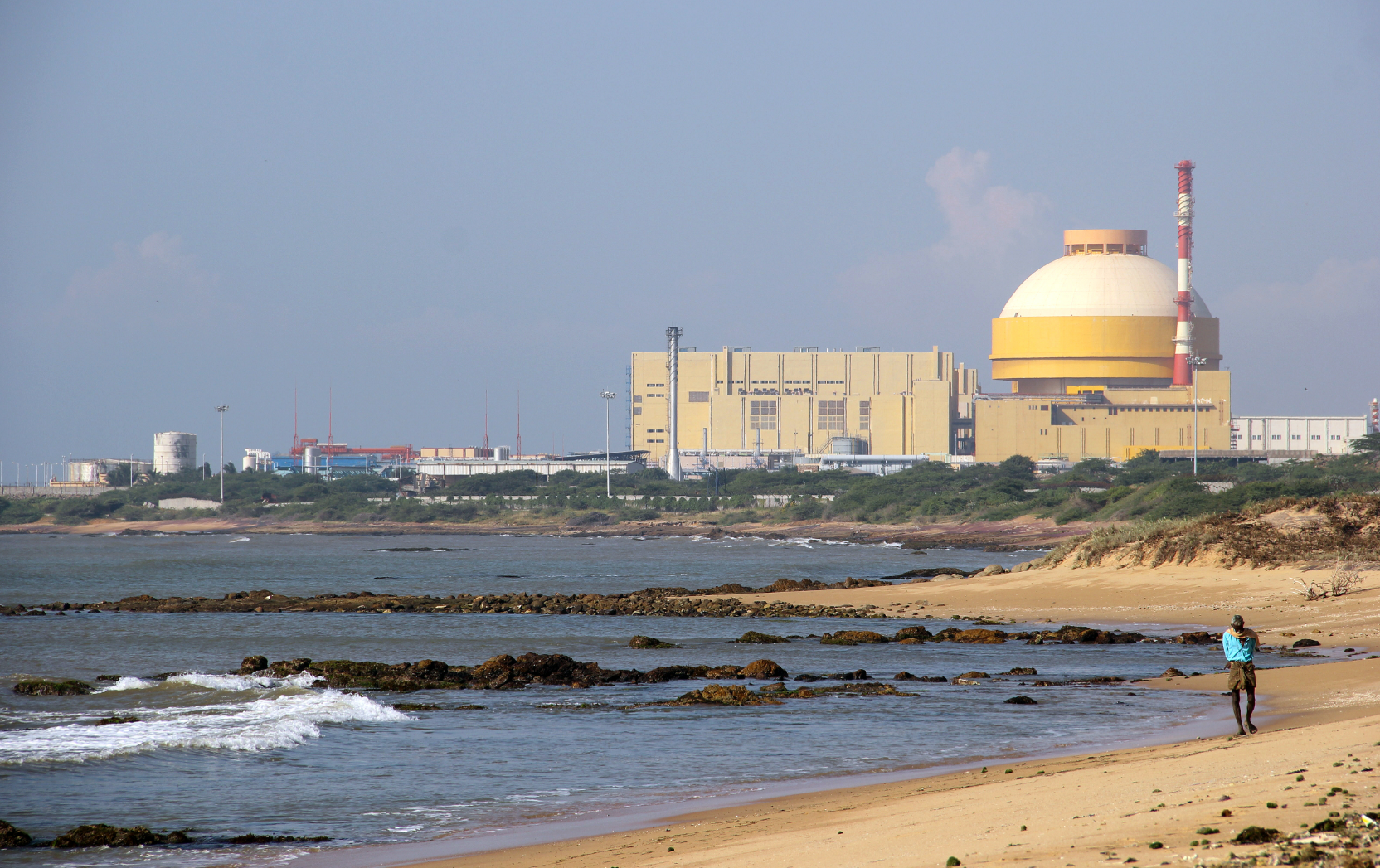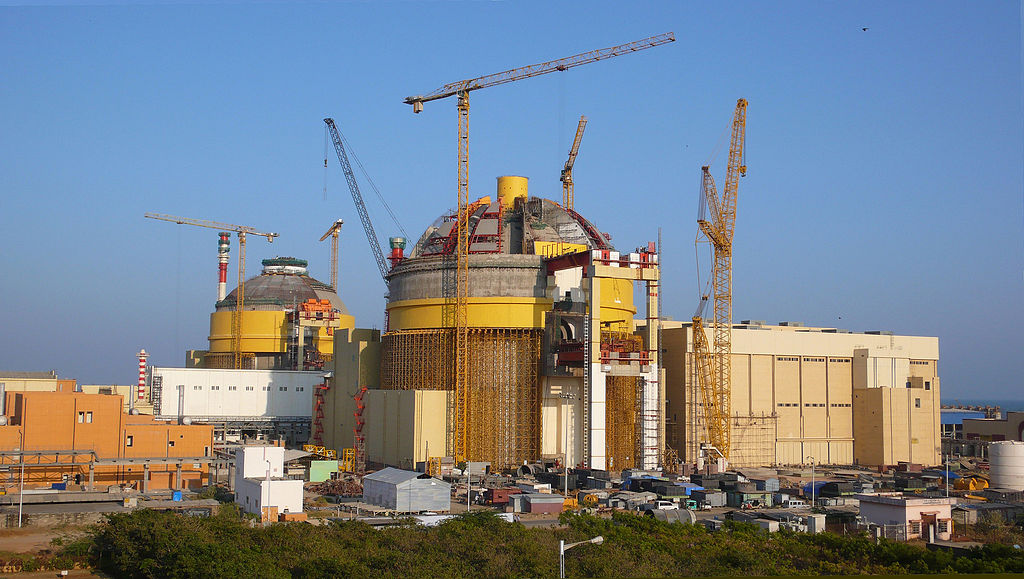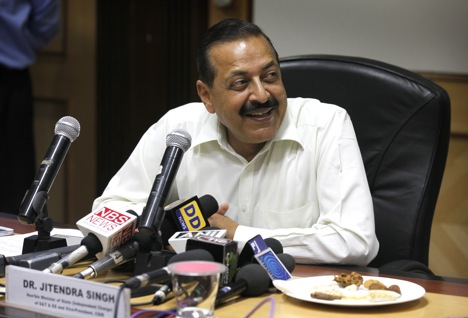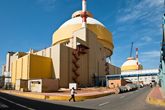Kudankulam NPP performance lauded

Kudankulam NPP is incorporating the largest power unit in the Indian Electricity System, as each reactor is producing 1000 MW.
indiawaterportal.org / wikipedia.orgThe performance is excellent
“I am very happy to share that we have recently completed 175 days of continuous operation of Unit 1 and its performance is excellent,” R. S. Sundar, KNPP site director, told journalists.
Speaking on the occasion of India’s Independence Day, on August 15, he said Unit 1 had generated 10,900 million units of electricity since its synchronisation with the Southern grid after the reactor gained criticality on July 13, 2013.
“The dedication to the nation of the Unit 1 of Kudankulam nuclear power plant is a very significant milestone in Indo-Russian relations”, he said.
Sundar also praised efforts of KNPP’s Public Awareness Team to reach out to as many people as possible to bust the myths about nuclear energy.
“Almost one lakh (100,000) people visited the KNPP site through various programmes since 2011. More than 350 lectures and seminars were organised in schools, colleges, and other forums through which the KNPP met over 5 lakh people. This helped us in making the public understand the safety of the KNPP reactors clearly,” Sundar said.
Valery Limarenko, President of ASE Group of Companies, the Engineering and Construction Division of Rosatom, the Russian State Atomic Energy Corporation, said that Unit 1 had surpassed design expectations with the actual performance of Unit 1.
“The first ever Russian-designed nuclear power unit jointly built in India fully meets all state-of-the-art safety requirements and demonstrates steady operation”, Limarenko said.
Vasily Zhurko, member of the State Duma (Upper House of Russian Parliament) Energy Committee, told RIR that efficiency of Unit 1 was 2,4% higher than the designed figures, and capacity factor is 2.5% higher, so India had a more advanced NPP than had been initially planned. Indo-Russian cooperation in the field of nuclear energy is mutually beneficial. That`s the reason why our countries are likely to go beyond the construction of KNPP and build units at other sites”, he said.
“Russia has always been a reliable partner of India either in the field of nuclear energy or any other area of cooperation. Russian nuclear technology has proven its high quality and best price worldwide. Other countries are also aware of the highest quality of Russian technologies. That`s why all our partners including India, China and Iran where we have been participating in the construction of nuclear power plants opts for developing and expansion of the cooperation with Russia,” Zhurko added.
Highest standards of safety and reliability
M.R. Srinivasan, first Chairman of the Nuclear Power Corporation of India Ltd. (NPCIL) said India was satisfied with the safety provisions of Russian nuclear power units.
“Indian and Russian nuclear safety regulatory authorities have collaborated at Kudankulam to enhance the safety of the its reactors substantially,” he said.
Srinivasan recalled the recent launch of Unit 6 of the Novovoronezh NPP in Russia with VVER-1200, the first 3+ generation reactors in the world, and said India expected the new unit also to have highest standards of safety and reliability.
“Kudankulam NPP is incorporating the largest power unit in the Indian Electricity System, as each reactor is producing 1000 MW. Our other power units, nuclear or coal fired, are of smaller size. Therefore, Kudankulam means an important jump in the size of the power unit”, he said.
“Indo-Russian cooperation in nuclear power is an important part of Indian nuclear development. The power systems of Tamil Nadu, Kerala, Karnataka and Pondicherry will greatly benefit from Kudankulam NPP,” Srinivasan added.
Potent symbol of Indo-Russian cooperation
“The Kudankulam NPP is a potent symbol of Indo-Russian cooperation and of our time-tested friendship and relationship. It is important that Kudankulam perform at top-quality ratings and ensures complete safety. One welcomes Russia’s commitment to these demanding standards. We wish them all the very best in setting a global example at Kudankulam,” senior Congress leader Mani Shankar Aiyar said in an interview to RIR.
Aiyar said there was “every possibility of further success in bilateral nuclear energy cooperation, if KNPPP meets the high expectations of efficiency and safety that both Russia and India desire.”
“But it must be noted that both at Kudankulam and at every proposed site for NPPs, the local people get very agitated and concerned about their future and their livelihood, especially fishermen. Additional locations would depend very much on these concerns being addressed and on the administration ensuring that rehabilitation and resettlement problems of displaced persons are given no less attention than the setting up of the NPP itself,” he said.
On Indo-Russian relations, Aiyar said they should be driven primarily by shared political perceptions and common interests in promoting global peace and disarmament.
“Of course, nuclear energy and defence requirements will figure prominently in any practical agenda of cooperation, but the relationship should be driven by higher objectives and a noble vision for our peoples and for humankind,” he added.
Russia always helps
R. Rajaraman, Emeritus Professor of Theoretical Physics, School of Physical Sciences, Jawaharlal Nehru University told RIR that Russians have always been very helpful in India’s nuclear programme.
“They started construction of Kudankulam NPP even before the Nuclear Suppliers Group (NSG) sanctions were lifted, on the basis of a "grandfathering" rule. By now Unit 1of the Kudankulam NPP is producing energy and that is a big input into our nuclear power generation capacity. All this will greatly help us achieve the nuclear energy targets for 2030”, he said.
Rajaraman thinks the importance of nuclear energy has further increased in the view of the Climate Change crisis and India's commitments at the Paris Climate Change Conference.
All rights reserved by Rossiyskaya Gazeta.
Subscribe
to our newsletter!
Get the week's best stories straight to your inbox


